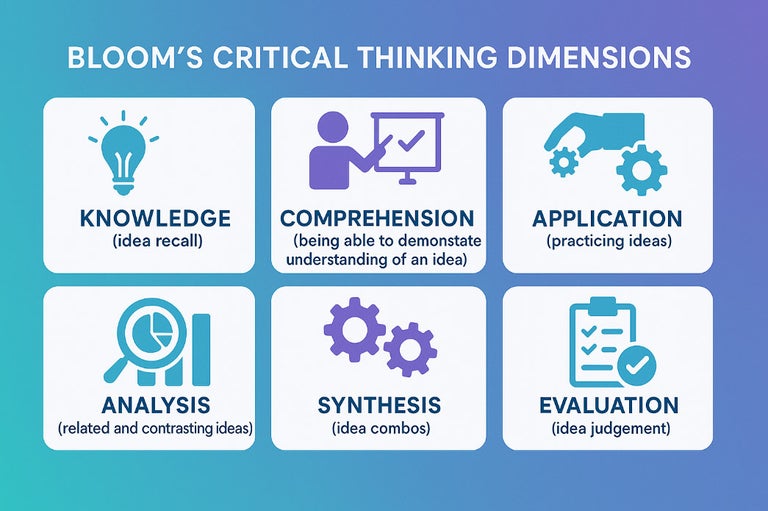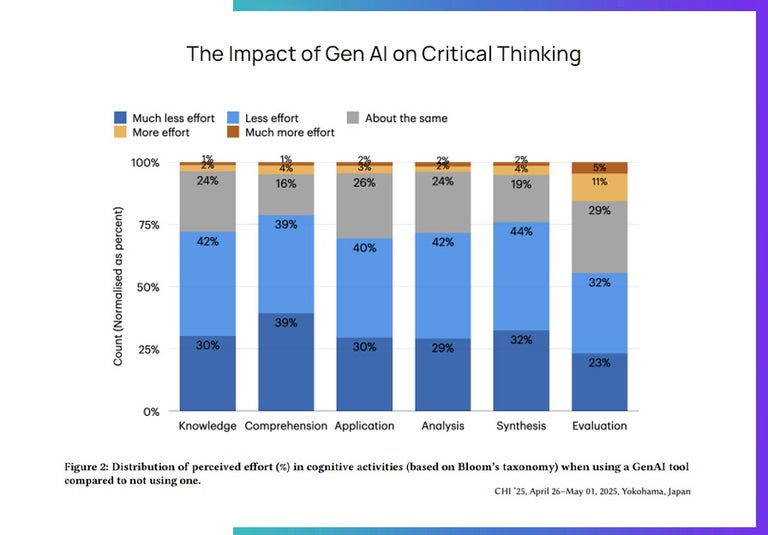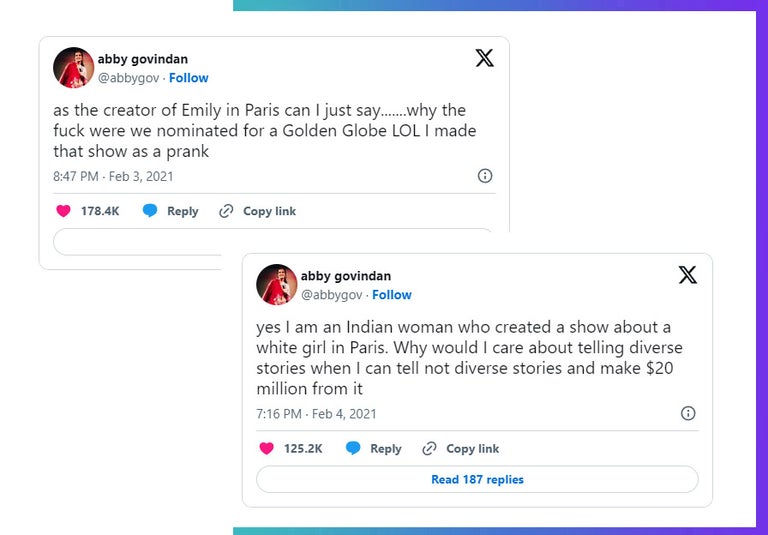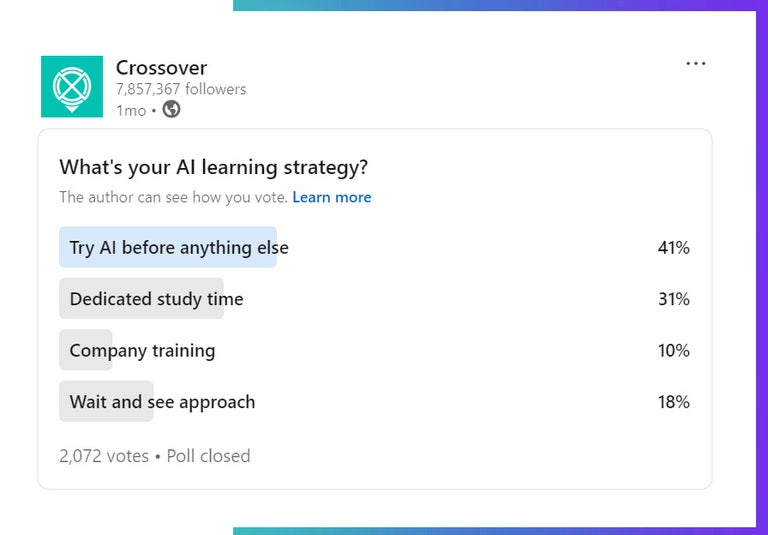Contents
- The Illusion of Intelligence and the Thinking Trap
- The Death of Deep Thinking (+Your Mental Upgrade)
- The Post-Truth Solution is Metacognition
- 3 Habits to Build Your Metacognition Muscle
- Your Quality Bar Won’t Lift Itself (Don’t Skip Your Mental Workouts)
Are you getting smarter with AI - or are you just outsourcing your brain? As AI tools take over thinking, too many smart people are losing their edge. In this article, you’ll learn why critical thinking is eroding, what Kahneman got right about mental shortcuts, and find out how to rebuild your metacognition muscle before your brain turns to mulch.
Why does it feel healthier to watch fitfluencers exercise on Instagram?
There are about 50,000 of them on the platform dishing out lifestyle tips and advice on achieving physical perfection at any given time. It draws huge audience numbers.
Brains are weird. The internet is weird.
It somehow feels healthy to watch fitness influencers lifting weights, even when you’re slumped into a couch, hot chocolate in hand.
I’ll be the first to admit: I do this on occasion.
But it’s not making me fitter AT ALL. Or smarter. My muscles feel nothing. And a lot of their secret tips and advice are, well - pure nonsense.
It struck me the other day, as I was once again ‘learning’ new gym techniques. Using AI tools is not so dissimilar from what I had been doing at lunch.
It’s easy to use AI these days to do your thinking for you. But it’s exactly like watching someone else on Instagram lift weights.
It feels productive – heck you might even convince yourself that you’re learning for a future time when you DO pick up your 7kg dumbbells for a bicep blasting session.
But is that the truth? Or are you sacrificing healthy practice for the promise of a more efficient future?
You’re not getting any stronger. Your mind is in lala land while your cognitive muscle (yes, your brain) wastes away.
What exactly is the impact of allowing AI to do the cognitive heavy lifting for you? I had to find out.
The same way authentic physical strength requires actual resistance > intellectual strength requires real, concerted effort.
When you outsource your thinking to AI – every insight, every draft, every decision you make about your work - you don’t just save time thinking.
You forgo the opportunity to think deeply about what you’re doing.
So, in this article, I’m breaking down what’s really at risk when we hand over too much of our mental work to machines (and how to avoid the dangers). I’ll explore why smart people are sinking into lazy thinking, look at AI reliance and modern critical thought theory – and consider a new mental mode to adopt called metacognition.
And of course, I give you three practical habits to keep your thinking sharp and your judgement clear, so that you can stay mentally fit in a world where AI does the heavy lifting for you.
The Illusion of Intelligence and the Thinking Trap
Everyone in tech is talking about critical thinking.
It’s at risk. It’s already pretty rare. But now with AI use on the rise, it’s practically being erased.
Microsoft did a study on the impact of Gen AI on critical thinking. Wow it’s an eye-opener! In the study the experts clearly state that improper use of AI leads to the deterioration of cognitive faculties.
AI-assisted knowledge work NEEDS critical thinking:
- Knowledge (idea recall)
- Comprehension (being able to demonstrate understanding of an idea)
- Application (practicing ideas)
- Analysis (related and contrasting ideas)
- Synthesis (idea combos)
- Evaluation (idea judgement)
These are the dimensions you tap into when accessing your quality bar.

The overwhelming results of the study were that while Gen AI absolutely improves speed and efficiency, it also dulls critical thinking by encouraging overreliance on the tool, and diminished skill building in independent problem-solving.

TL;DR: Gen AI directly negatively impacts your ability to think critically over time – IF you misuse it.
For me, this means being acutely aware that if I’m not careful, my quality bar will decline over time as my critical thinking atrophies. And that is unacceptable.
AI feels smart, right?
It delivers answers instantly, packages them in clean language, and sounds confident doing it. That’s precisely why it’s super dangerous.
AI isn’t replacing you, it’s bypassing you – and you’re letting it happen!
Smart people, especially those used to thinking fast and producing quality work, are the MOST likely to fall for this illusion of intelligence.
AI's output fluency creates a false sense of competence - in the machine and in yourself. You read a convincing summary or a well-structured paragraph and think, “Oh yeah, that works.”
But what you’re REALLY doing is skipping the deeper cognitive reps.
And when you stop using a muscle, especially your brain - it degrades.
Our VP of Talent and People Ops Heather Lother says,
“Your brain is a muscle, and critical thinking is one of the most important things it does. If you stop using a muscle, what happens? It atrophies. I believe that if you stop thinking critically, that part of your brain atrophies too. Then, the hard tasks that AI can't handle become SO much harder because your muscle is weak.”

You see – it’s exactly like ONLY watching fitfluencers!
The negative impact isn’t just now, it’s in your future too. You’ve worked so hard to have the mental strength to do what you do, but if you’re not careful that could decline.
As you lazily allow the hard work to be done for you, when truly hard work strikes in a couple months, or a year, or 5 – you’re screwed.
The Death of Deep Thinking (+Your Mental Upgrade)
Knowing HOW to think is more important than knowing WHAT to think.
A couple of years ago I read an incredible book by author Daniel Kahneman called ‘Thinking Fast and Slow.’ Dan’s field was behavioral economics and psychology, and he won the 2002 Nobel Prize in Economic Sciences for his theories.

Dan had two theories of thought:
- System 1 is fast, automatic and emotions-based
- System 2 is slow, deliberate and logical
With AI’s rise, Dan had insight into this mental shortcut trap LONG before AI sprang onto the scene. We all think in both modes, but our ability to tap into the second system is what gives smart people the edge.
Now here’s the problem – AI FEEDS system 1.
The system that most people default too – thinking quickly and easily. AI gives us the answers, it erases the cognitive load that system 2 needs. And when things feel this simple, our brains go with the flow.
So, we’re thinking and moving faster than ever.
But it’s system 2 that keeps us making smarter, more informed decisions. Especially when there’s a lot at stake. When you amplify system 1 with AI, you’re making system 2 dormant.
With system 2 under exercised, you become prone to bad assumptions, shallow analysis and the general nonsensical tomfoolery that AI can pass off as REAL.
It was already a struggle to focus on system 2 pre-AI. Now we need a third layer of thought when working in conjunction with artificial intelligence.
Thinking fast is ONLY an advantage when you’ve consistently trained yourself to know when to slow down.
In a post-truth, prompt-fed world, your brain needs a comeback.
And that comeback is system 3: metacognition.
The Post-Truth Solution is Metacognition
Pre 2020 was the information age – now we’re in the plausible nonsense age.
Most people will happily misuse AI, like they happily misuse the internet. And that’s reshaping information everywhere. And by reshaping, I mean making most of it ‘junk.’
AI can explain anything! But confidence is not the same as accuracy.
A few days ago, I came across a delightful story from comedian Abby Govindan which communicates the current critical thinking decline beautifully.
Abby went on X and lied (to prove a point). She claimed to be the creator of Emily in Paris.
That the show was a joke and didn’t deserve a golden globe – and that it was only bought by the network after making all the characters white.
Many people and news outlets (including the BBC) picked up her tweets and syndicated content about them like they were true. Even though a basic Google search would have immediately debunked her lies.
What Abby exposed was mass mental laziness.

We’re so conditioned to believe polished statements, viral posts, and AI-generated outputs that we don’t pause to ask, “Is this true?” or “How do I know this?”
AI makes it all sound right.
That’s why you need to be the one who thinks twice. This is the real risk in the plausible nonsense era - not that we’re uninformed, but that we’re confidently misinformed.
Metacognition is the solution.
It’s the ability to think about your own thinking. A kind of mental overhead view that lets you observe, question and adjust how you process information.
You know things, sure. But this is about HOW you know them, WHY you believe them to be true and whether you’re approaching it with clarity or bias.
This third layer of thinking – metacognition – will keep you in control.
Let’s rebuild the habit of questioning your inputs. You need to think about how you’re thinking, especially when the output sounds flawless.
Because AI can’t save you from bad thinking - only you can do that.
3 Habits to Build Your Metacognition Muscle
There are a number of excellent metacognitive habits or skills that you can build to ward off the atrophy of using AI every day.

I’ve personally integrated some of these into my processes lately, and it’s done wonders in helping me spot inefficiencies that would have scaled quickly if I hadn’t done the deep-thinking work first.
Habit #1: Lift With Manual Mental Reps First
AI can break down concepts, but only you can break through them.
Just like watching someone else do squats won’t build your glutes, letting AI do all the thinking won’t build your brain.
We asked our LinkedIn community what their AI learning strategy was, and what they said was somewhat alarming.

In a 2025 poll of 2,072 people, 41% said they try AI before anything else.
That means nearly half default to automation before effort - skipping the mental warmup entirely. Sure, jumping straight into practical AI use builds tool familiarity.
But it also trains your brain to avoid struggle > the very thing that builds cognitive strength. When your first instinct is to ask the bot, not yourself, you’re outsourcing the reps. And over time, those skipped sets add up.
If you want real gains, treat AI like a training partner - not a replacement for the workout.
Before you prompt, pause.
Solve the problem, write the draft, or form the opinion yourself > then use AI to refine it, rewrite it or challenge it.
Practice cognitive effort first - and automation second.
Use AI to polish your process, not replace it.
Heather says that struggle is the foundation of learning and when you skip it, you skip growth.
“You are more likely to learn something by finding surprises in your own behavior than by hearing surprising facts about people in general.” – Dan Kahneman
Manual mental mode builds intuition, pattern recognition, and stronger memory.
- Daily mental workouts = long-term cognitive strength.
Habit #2: Think Like a Form Coach (Not a Fan!)
Your AI’s answers might LOOK clean, but that doesn’t mean they’re solid.
Think of each response like a form check at the gym. Just because it looks right doesn’t mean your foundation is strong. You have to go way deeper than that or risk injury!

Smart people don’t just passively consume answers. They challenge them.
They pause and ask:
- Is this accurate?
- What’s missing?
- What assumptions is this making - and do I agree with them?
If you’re not asking these kinds of questions, you’re letting fluency trick you. The more confident AI sounds, the easier it is to trust, even when it's outrageously wrong.
AI repeats itself, a lot. And this can be mistaken as truth.
“Familiarity is not easily distinguished from truth.” – Daniel Kahneman
The Stanford Institute for Human-Centered AI has studied the problem of AI overreliance.
Their study found that asking for explanations and actively engaging with the AI’s process reduces reliance. It allows you to cognitively engage in a way that increases understanding.
Be curious. When AI gives you a recommendation or result, ask it to walk you through the reasoning. This reveals its flaws, and it forces you to engage in critical thinking.
If you wouldn’t accept vague, unclear and unsubstantiated advice from a fitfluencer on Instagram, you shouldn’t accept vague output from a machine either.
AI is the assistant. You’re the coach.
Never stop questioning the form.
Habit #3: Spot Yourself Before You Wreck Yourself
AI can help you produce a lot at break-neck speed. But output isn’t understanding!
The real metacognitive task is to create meaning from what AI gives you. After you use AI, don’t just move on – pause and reflect.

Ask:
- What did I actually learn here?
- Could I explain this simply to someone else?
- Would I make the same decisions again?
This is where System 3 thinking kicks in > the meta-layer I spoke about earlier. It’s your internal spotter, scanning your system 1 instincts and your systems 2 logic.
It asks:
- Was that me thinking… or just reacting to what the AI gave me?
- Why did I prompt it that way?
- Did I get what I needed - or just what was easy?
This is the habit that builds metacognition - your ability to step outside your thoughts and assess the process, not just the result. It’s what turns information into insight, and output into authentic wisdom.
Don’t just copy the AI’s form - own your own transformation. This is how thinking becomes compounding, not just repetitive muck that destroys your quality bar.
It’s how you stay in control - even when AI is lifting heavier and heavier loads for you.
As Kahneman put it: “Acquisition of skills requires a regular environment, an adequate opportunity to practice, and rapid and unequivocal feedback about the correctness of thoughts and actions.”
Turns out you don’t just need output from AI. You also need feedback, pattern recognition, and deliberate reflection. AI won’t do that for you.
But you can do it for yourself - if you build the habit of meaning-making into every interaction you have. That’s how you activate System 3.
THAT’s how you think better, not just faster.
Your Quality Bar Won’t Lift Itself (Don’t Skip Your Mental Workouts)
Do you even lift, bro?
The future of work will be divided between those who use AI irresponsibly, and those who practice metacognitive habits to keep up with unpredictable machines.
AI isn’t the enemy of authentic intelligence – that’s passive use.

It’s SCARY to think that slowly AI could bypass how we think, making us instruments of our own ignorance and stupidity.
The real danger for smart tech people isn't that they’ll be replaced by AI - it's that they'll allow their brains to weaken while AI keeps getting stronger.
It’s not going to happen all at once. It will be subtle and silent. Like skipping leg day because you’re sore, or telling yourself that watching a deadlift tutorial counts as effort.
One shortcut here. One missed rep there. Suddenly, your quality bar is a trash fire and you don’t even remember dropping lit matches.
The antidote is metacognition - your internal coach, spotter, and form-checker all in one. Thinking better isn’t about speed. It’s about control.
It’s about asking better questions, challenging assumptions, and staying actively engaged in your own cognitive growth.
No AI can learn FOR you.
Every time you choose to think before you prompt, challenge an AI response, or reflect on what you just learned, you’re building durable mental strength.
That’s the good stuff that compounds. That’s what keeps your edge sharp while everyone else is becoming a landfill of blunt butter knives.
So, treat your brain like a muscle worth training.
Do the cognitive lifting: Pause. Think. Reflect. Repeat.
That’s how you stay smart > even when the machines get smarter.









